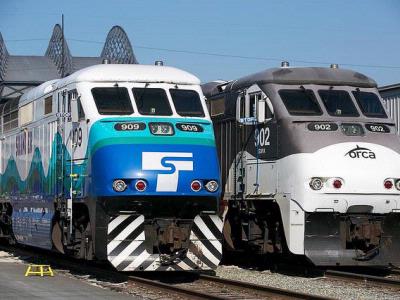
Sound Transit decision makers must be accountable
Saturday, January 23, 2016
 |
Rep. Mark Harmsworth, R-Mill Creek, and Sen. Steve O’Ban, R-Pierce County, seek to increase accountability for oversight of Sound Transit given its significant taxing authority and responsibility for large infrastructure projects in the Central Puget Sound area. Their proposal would move Sound Transit’s currently appointed board, to one elected by districts. Sound Transit, which provides high capacity transit in King, Pierce and Snohomish Counties, is currently overseen by 18 city and county elected officials appointed by each county’s executive.
“Sound Transit has responsibility for billions of our tax dollars,” said Harmsworth, who serves as assistant ranking member on the House Transportation Committee. “It’s time our local communities have a direct say in electing those who will be making those decisions.”
The proposal would establish a regional transit authority board composed of nineteen nonpartisan members elected from separate electoral districts in the three-county area. A five-member commission appointed by the governor would develop the districts with equal population represented.
The regional transit authority has taxing authority, subject to voter approval, to develop and operate Link Light Rail, regional express buses and Sounder commuter trains.
“Sound Transit is not directly accountable to Sound Transit voters,” said O’Ban. “The immense size of its revenue and scope of work doesn’t match the oversight for budget decisions much larger than even some of the state’s largest cities. That structure demands direct accountability to voters, a move away from political appointments and more hands-on and active management.”
While 2.5 million people currently live within the transit authority boundaries, the current board structure of appointed elected officials leaves more than 1 million people unrepresented. Cities with a member on the board make up about 1.5 million residents with large cities including Kent, Renton, Kirkland and Auburn without directly elected representation.
Calls to move away from the appointment process date back to 2003 when then Gov. Gary Locke’s Blue Ribbon Transportation Committee recommended a new approach. Since then a variety of proposals have attempted to address the issue with different approaches.
“Voters eventually supported two infrastructure packages and we want Sound Transit to succeed in its mission to create a transportation system to move people around the Puget Sound in a cost-effective and efficient manner,” continued O’Ban. “This bill will add a level of accountability and oversight to a bureaucracy that desperately needs it in order to reach that objective.”
Sound Transit is expected to seek voter approval in 2016 for a third round of projects and funding called “ST3” after state lawmakers provided authorization in the 2015 transportation investment package.